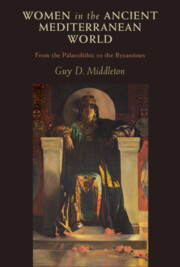Book contents
- Women in the Ancient Mediterranean World
- Women in the Ancient Mediterranean World
- Copyright page
- Dedication
- Epigraph
- Contents
- Preface
- Acknowledgements
- Timeline
- Historical Contexts
- Introduction
- Part I The Deep Past
- Part II The Bronze Age
- Part III The Iron Age
- Part IV The Hellenistic Worlds
- Part V The Age of Empire
- 24 Cleopatra Selene
- 25 Eutychis
- 26 Achillia and Amazon
- 27 Perpetua
- 28 Zenobia
- 29 Hypatia
- 30 Theodora
- Notes
- Select Bibliography
- Index
28 - Zenobia
from Part V - The Age of Empire
Published online by Cambridge University Press: 19 January 2023
- Women in the Ancient Mediterranean World
- Women in the Ancient Mediterranean World
- Copyright page
- Dedication
- Epigraph
- Contents
- Preface
- Acknowledgements
- Timeline
- Historical Contexts
- Introduction
- Part I The Deep Past
- Part II The Bronze Age
- Part III The Iron Age
- Part IV The Hellenistic Worlds
- Part V The Age of Empire
- 24 Cleopatra Selene
- 25 Eutychis
- 26 Achillia and Amazon
- 27 Perpetua
- 28 Zenobia
- 29 Hypatia
- 30 Theodora
- Notes
- Select Bibliography
- Index
Summary
In ad 272, the Roman emperor Aurelian defeated his eastern enemy, the empress Zenobia of Palmyra (Figure 28). As befitting a victorious Roman general, he celebrated an immense triumph in Rome, which is recorded in the Historia Augusta as a ‘most brilliant spectacle’.1 In the procession, there were three richly bejewelled chariots from the east, two from Palmyra, one a gift from the king of Persia, and Aurelian’s own chariot, drawn by four stags, which had once belonged to the king of the Goths. There were elephants, tigers, giraffes, elk, and two hundred other ‘tamed beasts … from Libya and Palestine’. There were 800 pairs of gladiators, bound prisoners from sixteen different peoples, northern, eastern, and southern, including some ‘Amazons’ – Gothic women who had fought against Rome. The various peoples held placards identifying their nations for the watching crowd. And of course, there were the political prisoners – Tetricus, a Roman who had set up his son, also present, as emperor in Gaul, wearing outlandish Gallic trousers. Then there were some of the great and good of Palmyra, ‘and there came Zenobia … decked with jewels and in golden chains, the weight of which was borne by others’. The people of Rome and the senators also took part in the procession and days of games and shows followed.
- Type
- Chapter
- Information
- Women in the Ancient Mediterranean WorldFrom the Palaeolithic to the Byzantines, pp. 227 - 235Publisher: Cambridge University PressPrint publication year: 2023

